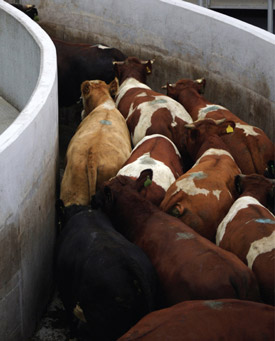Cattle drug’s sales suspended after lameness reports

A drug company suspended sales in the U.S. and Canada of a beta-adrenoceptor agonist used to add dozens of pounds of muscle to cattle.
Beef sellers had reported that the drug could be connected with incidences of lameness.
Merck Animal Health announced Aug. 16 that the company was suspending sales of Zilmax (zilpaterol hydrochloride) and planning a scientific audit of the process of feeding the drug to cattle. In doing so, the company hoped to find possible causes of lameness and “other mobility issues” as cattle moved from feedyards through packing plants.
Earlier in August, Tyson Fresh Meats said in a letter to suppliers in the cattle feeding industry that the company would, on Sept. 6, stop buying cattle fed Zilmax. The company said it was suspending such purchases in response to suggestions by animal health experts that use of Zilmax could be responsible for instances in which cattle arriving at slaughter plants were lame or unable to move.
“This is not a food safety issue,” the letter states. “It is about animal well-being and ensuring the proper treatment of the livestock we depend on to operate.”
Merck officials responded with statements they were confident that “the experience reported by Tyson is not attributable to Zilmax,” and described in a subsequent statement the pending audit. Merck officials expressed confidence in the drug’s safety and performance.
Following Merck’s decision to suspend Zilmax sales, Cargill announced that it supported the decision and would suspend purchase of Zilmax-fed cattle as part of its commitment to good animal welfare. In Cargill’s supply chain, the last cattle receiving the drug would be slaughtered in September.
Cargill’s announcement indicated that concerns about the drug emerged at an August meeting of the National Cattlemen’s Beef Association.
“Multiple packers referenced situations that they believed may have been linked to Zilmax, although no scientific studies had made such a connection,” the announcement states. “Dr. Temple Grandin, the world-renowned animal welfare expert, was present and expressed concerns.
“While Cargill has not linked Zilmax to any specific incidents involving animal well-being, the company does believe more research is necessary to answer recently raised questions regarding the use of this product.”
Zilmax has been approved for over-the-counter sale since 2006 and labeled for use in improving feed efficiency and increasing carcass leanness, according to the Food and Drug Administration. Information from Merck indicates typical cattle fed the drug over 20 days can gain approximately 30 pounds.
Dr. Bill Swafford, executive secretary for the Academy of Veterinary Consultants, said in September that the AVC had not taken a position on the drug and was collecting information for discussion at a meeting in December. He expects more data also will be available for consideration by early 2014.
Dr. Swafford had not heard reports of animal welfare problems directly connected with use of Zilmax.
Asked about the NCBA’s position on the suspension of Zilmax sales, spokesman Chase Adams said the NCBA is “for technology and in support of government-approved technology” and declined to provide further comments.
Cargill’s announcement states that, by 2012, between 70 and 80 percent of U.S. cattle were fed Zilmax or Optaflexx, a beta-adrenoceptor agonist sold by Elanco Animal Health for use in increasing weight gain and feed efficiency. A Merck spokeswoman declined to provide sales information connected with Zilmax but similarly said more than 70 percent of beef cattle receive beta-adrenoceptor agonists.